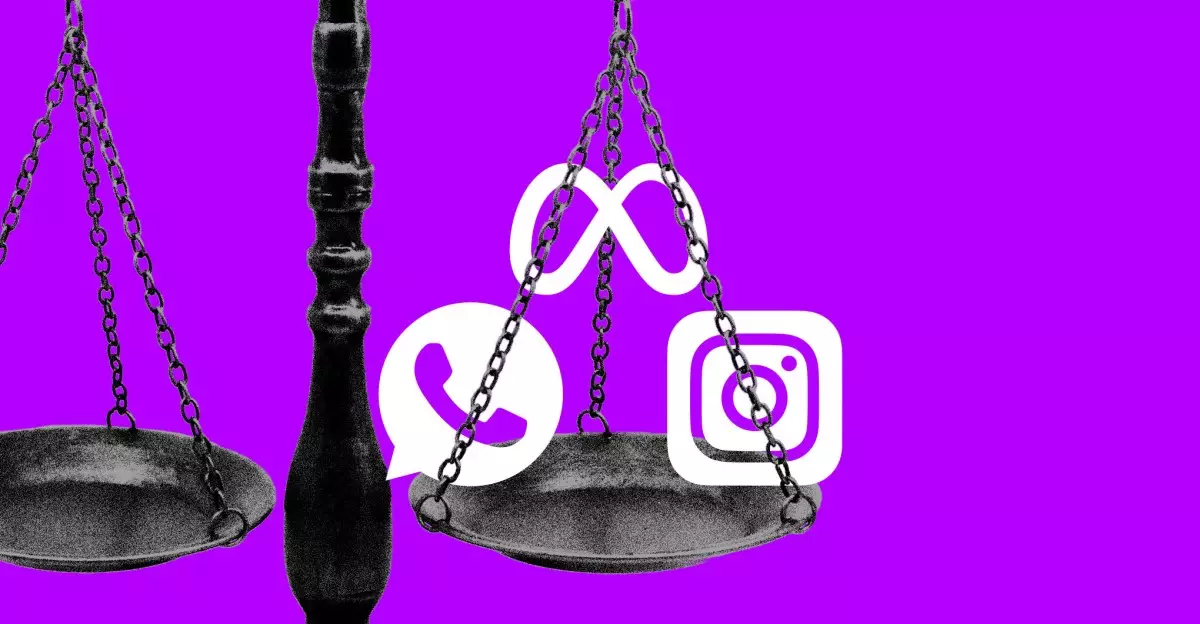In an era where technology companies wield unprecedented influence, few stories are as complex and compelling as that of Meta, formerly known as Facebook. The recent trial, FTC v. Meta, has brought to light not just the company’s high-profile acquisitions, but the strategic reasoning behind them. Mark Zuckerberg’s testimony turned out to be a masterclass in corporate defense, where he had to articulate the philosophy that drove him to acquire prominent platforms like WhatsApp and Instagram. The outcome of this legal battle will not only impact Meta’s future but also shape the landscape of antitrust laws in the tech industry.
Confronting the Government’s Narrative
During the trial, the Federal Trade Commission (FTC) argued that Zuckerberg’s intent behind acquiring these applications was nefarious—essentially to “snuff them out” before they could grow into formidable competitors. Under scrutiny for about 13 hours spread across three days, Zuckerberg had to respond directly to this accusation. His notable statement, “I’d do it again,” regarding the $19 billion purchase of WhatsApp, attempts to shift the narrative from a monopolization strategy to one of visionary expansion.
Zuckerberg characterized WhatsApp as a crucial pivot in online communication—an avenue that moved away from public social networks to more private engagements. He acknowledged concerns over private messaging apps blossoming into full-fledged social media outlets. Yet, in his testimony, he expressed skepticism regarding WhatsApp’s potential to compete with Facebook, citing its founders’ disdain for social media and advertising. Rather than a threat, he positioned the acquisition as a strategic necessity for adapting to changing communication paradigms.
The Private Messaging Shift: A Business Perspective
Transitioning from public social interaction to private messages was not simply a fad; it was a cultural shift that Zuckerberg recognized early on. His observation that public conversations were declining in favor of private threads made WhatsApp a valuable asset, not only for its user base but also for its potential to create a buffer against larger competitors like Apple and Google. This reasoning enhances the image of Zuckerberg as a forward-thinking leader rather than a cutthroat monopolizer intent on stifling competition.
Although he acknowledged some limitations to this strategy—remarking that it might not have significantly shifted negotiations with app store giants—his reasoning reflects a nuanced understanding of market dynamics. It posits that the acquisition was intended not just as a means to eliminate competition, but to fortify Meta’s position in a competitive tech ecosystem.
Instagram: The Perception of Insecurity
Zuckerberg’s defense of Instagram’s acquisition tells a contrasting story. While the FTC paints a picture of Zuckerberg being fearful that Instagram could siphon engagement from Facebook, he claimed to have only begun to worry about Instagram’s competitive potential after it surpassed the 1 billion user mark. Here, the narrative shifts. The co-founders of Instagram were initially considered to share Zuckerberg’s vision of social media growth, and the fact that Zuckerberg later directed the Instagram team to minimize reliance on Facebook for user traffic reinforces the foresight he had for both platforms.
Internal documents reveal that Instagram had merely 10 million users at the time of its purchase, a figure that might seem insignificant compared to the platform’s current base of over 2 billion users. This immense growth underscores Zuckerberg’s strategy: to nurture and invest in potential giants that could otherwise flounder in the crowded tech marketplace.
Shifting Paradigms and Miscalculations
As the trial progressed, it became evident that internal discord existed within Meta even during these acquisitions. Sheryl Sandberg, the former COO, candidly admitted during her testimony that she believed they had overpaid for Instagram. This acknowledgment complicates the narrative; it introduces the idea that even within the ranks of Meta, there were doubts about the strategies employed.
The eventual success of these platforms may have exceeded both Zuckerberg’s and Sandberg’s expectations, demonstrating the unpredictability of tech ventures. It raises questions about risk assessment in strategic acquisitions. If these platforms were indeed viewed as overly expensive or even unnecessary threats, how could they have evolved into significant revenue-generating pipelines for Meta?
A Broader Implication for the Tech Industry
The ongoing trial encapsulates a broader issue within the tech industry: balancing aggressive growth via acquisitions and the ethical implications of potentially monopolistic behavior. Zuckerberg’s testimony offers insights into his rationale and vision, but the greater concern remains the lack of checks on tech monopolies.
For many, Meta represents both the potential for innovation and the peril of consolidation. As the case unfolds, it serves as a proverbial wake-up call for other tech companies and regulatory bodies alike. The results from this litigation could ultimately dictate not just Meta’s trajectory, but also inform future tech policies, shaping how acquisitions are viewed and regulated in an industry where competition and innovation must coexist.

